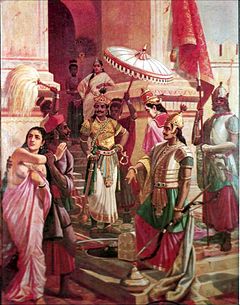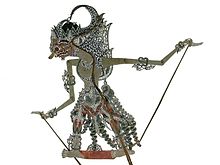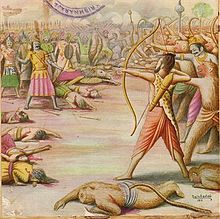- Indrajit
-
Indrajit (Sanskrit: इन्द्रजीत Indrajīt, Burmese: Indazita, Lao: Inthachi, Yuan: Indhajik, Tamil: Intiracittu, Thai: Inthorochit, Malay: Inderajati) or Meghanatha (Sanskrit: मेघनाथ), a warrior mentioned in the Indian epic Ramayana, was the son of the Lankan king Ravana. The word 'Indrajit' literally means the 'conqueror of Indra (the Hindu king of gods)'.
Indrajit played an active role in the great war between Rama and Ravana. He was said to be invincible in battle because of a Yajna he used to perform before every battle. He twice defeated Lakshmana and even Rama once, but on the third occasion Lakshmana disrupted the Yajna with the help of Vibhishana and killed him when he was unarmed.[1]
Contents
Biography
Indrajit was born to Ravana and his wife Mandodari, the daughter of Mayasura. He was named "Meghanada" because his birth cry sounded like thunder. He defeated Indra, the king of the Devas, after which he came to be known as 'Indrajit' ("the conqueror of Indra").
At a very young age, Meghnada became the possessor of several supreme celestial weapons, including Brahmastra, Pashupatastra, and Vaishnavastra, under the guidance of Shukra, the guru of the daityas (demons). He was married to Sulochana, the daughter of the King of the Serpents Shesha Naga.
Brahma's boon
During the Devasura Sangram (the battle between the devas and the asuras), he freed his father from the shackles of Indra. He then turned the tables on Indra, tying him up and mounting him onto his celestial chariot.
At this juncture, Brahma intervened and asked him to free Indra. Meghnada obliged, and was granted a chance to ask for a boon from Brahma. Meghanada asked for immortality, but Brahma remarked that absolute immortality is against the law of the nature. Instead, he was then granted another boon: he would never be won over in any battle, until his Yagna (fire-worship) of his native goddess Nikumbala was disturbed and detroyed. On the completion of the Yagna, a supreme celestial chariot would appear, boarding which, Indrajit would become invincible in any battle. But Brahma also cautioned him that whosoever would destroy this yagna would also kill him. It was Brahma who gave him the name Indrajit ("the conqueror of Indra").
Battle against Rama and Lakshmana
Indrajit joined the battle when all his brothers had been killed by Rama and his army. His father, Ravana, had been humiliated in the battle by Rama, and his paternal uncle Kumbhakarna had been killed by Rama. Indrajit fought with Rama's army for three days.
First day
On the first day of his battle with Rama's army, Indrajit was swift with his weapons. He swiftly wiped out the Armies of the Sugriva, calling on the Lord Rama and Lakshmana to come out of their hiding, so he could avenge the deaths of his paternal uncle and his brothers. When Rama and Lakshmana appeared before him, he fought fiercely, and arrested both the brothers using his most nefarious weapon Nagapash (a trap made of million snakes). Both the brothers fell on the ground breathless. They were rescued by the Garuda on behest of Hanuman, who was also the enemy of the serpents and also the flying vehicle of Narayana.
Second day
When Indrajit learned that both the Brothers Rama and Lakhsmana were still alive and were rescued by Garuda, he was fiery and vowed to kill at least one of the brothers that day. When the battle started, he used all his force to cast a havoc on the armies of Sugriva. At this Lakshmana appeared before him, and fought a fierce battle with him. When Indrajit realised that Lakshmana could not be won over, he started using his supreme magical powers, darting across the clouds and skies like a bolt of lightning. He combined his skills of sorcery and deceptive warfare, repeatedly vanishing and reappearing behind Lakshmana's back to catch him off-guard, when used his fiercest and deadliest weapon, Shakti. On being impaled in the back by the weapon, Lakshmana fell unconscious, poised to die precisely at the following sunrise. His life was saved by Lord Hanuman, who kidnapped the Rajvaidya(royal physician) Sushena from the Lankan fortress, and brought the whole mountain of Dronagiri from the Himalayas to Lanka overnight to find the remedy(the magical herb - Sanjivani) for the weapon used by Indrajit. Sushena first was hesitant to use the herb on an enemy, which was only common as he was abducted from Lanka and was in a bad mood, but when Rama reminded him of the ancient saying that physicians then used, "A physician has no friends or enemies", Sushena bowed beneath the saying and cured Lakshmana, who, aroused and ready, challenged Indrajit once more.
Third day
When Indrajit came to know that Lakhsmana had survived again, he went to his native deity's secret temple to perform the yagna that would make him invincible. Vibhishana, Indrajit's paternal uncle who left Ravana to join Rama in the name of truth and justice, learned of his nephew Indrajit's routine through his spies and alerted Lord Rama. Lakshmana and Vibhisana took the opportunity to face Indrajit in the "Yagnaagaar", where Indrajit would not touch any weapons. Indrajit fought Lakshmana with the utensils of the yagna and even managed to escape from there.
As the Valmiki Ramayana quotes, upon his Yagna being destroyed by the armies of Lakshmana, Indrajit became enraged and stormed out of the Temple Cave. Seeing his uncle Vibhishana (who had abandoned Ravana and joined Rama) at Lakshmana's side multiplied Indrajit's fury manifold. He vowed to kill his uncle Vibhisana along with Lakshmana once and for all, letting loose the Yama-astra which he had been conserving for punishing Vibhishana's perceived treason. At this juncture, Lakshmana protected Vibhsana, countering the Yama-astra owing to an earlier warning by Kubera. Fierce battle ensued, and unable to injure Lakshmana by normal means, Indrajit resorted to the use of the three Supreme Weapons (Brahmastra, Pashupatastra, and Vaishnavastra) on Lakshmana. To Indrajit's great shock and dismay, each of the three weapons refused to even touch Lakshmana, with the Vaishnavastra circumambulating Lakshmana before disappearing. Realization dawned on Indrajit that Lakshmana was no ordinary human as he and his father had perceived. Indrajit vanished briefly from the battlefield, returning to Ravana at the royal palace, and reported the developments, proposing that his father make peace with Rama and protect the demon race from further decimation. Ravana, blinded with pride, was unrelenting and annoyed, and even suggested that Indrajit was a coward having fled the battlefield. This accusation provoked Indrajit who briefly lost his temper, striking fear even at the mighty Ravana's heart before apologising and clarifying to his father that his primary duty as a son was to serve his father's best interests, and that even in the face of death, he'd never abandon Ravana. Preparing to go back on the battle and knowing that he indeed faced death at the hands of a heavenly incarnation, Indrajit bade his last goodbyes to his parents and his wife. He returned to the battlefield and fiercely fought Lakshmana with all his skill at both warfare, and sorcery. Lakshmana was unstoppable, and slew Indrajit by beheading him with the Aindrastra (verses 71 and 72 chapter 90 Yudhkanda Valmiki Ramayana). Upon his death his wife Sulochana became Sati on his funeral pyre.[2]
The verse invoked by Lakshmana to slay Indrajit is considered by the devout as one of the moola mantras of the Ramayana:dharmaatmaa satyasandhashcha raamo daasharathiryadi |
pauruShe chaapratidvandvastadenaM jahi raavaNim || 90-6-71
“[O! my dear arrow!] If Rama, the son of Dasaratha, is ever firm on the staying the path of Dharma and Satya, and is second to none in his prowess, go forth and destroy this Indrajit.”
References
- ^ The Ramayana and Mahabharata by Romesh Chunder Dutt
- ^ Pollet, Gilbert (1995). Indian epic values: Rāmāyana and its impact. Peeters Publishers. p. 62. ISBN 9068317016. http://books.google.com/books?id=EVnK3q48dL0C&pg=PA62&dq=Sulochana#v=onepage&q=Sulochana&f=false.
External links
Ramayana by Valmiki Ikshvaku clan Dasharatha · Kausalya · Sumitra · Kaikeyi · Rama · Bharata · Lakshmana · Shatrughna · Sita · Urmila · Mandavi · Shrutakirti · Lava · KushaVanara Rakshasa Ravana · Vibhishana · Kumbhakarna · Indrajit · Akshayakumara · Atikaya · Kabandha · Khara · Mandodari · Maricha · Mayasura · Prahasta · Subahu · Sulochana · Sumali · Surpanakha · Tataka · ViradhaSages Other characters Places Other Categories:- Rakshasa in the Ramayana
Wikimedia Foundation. 2010.





